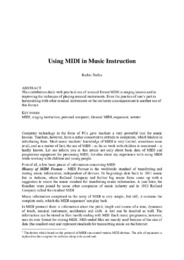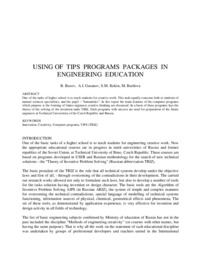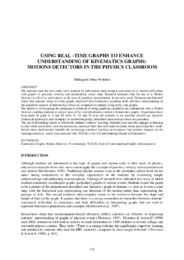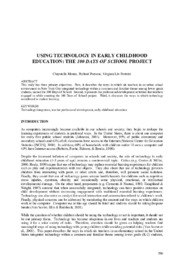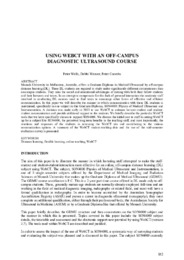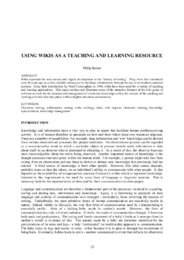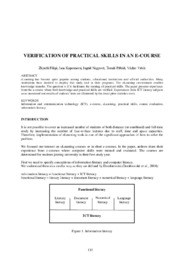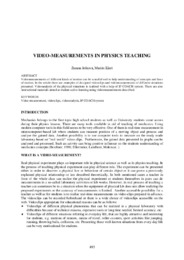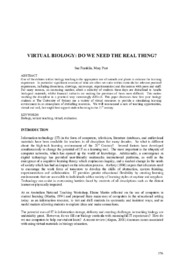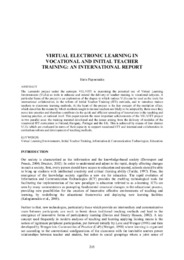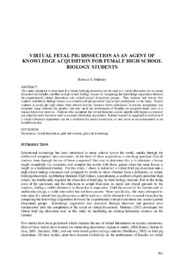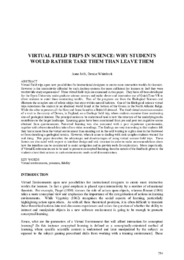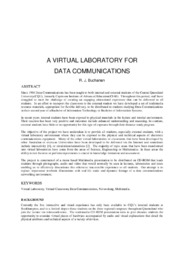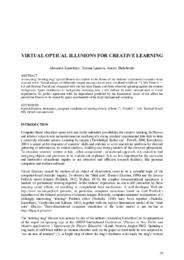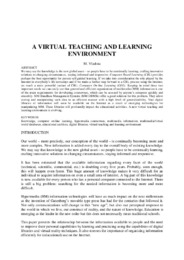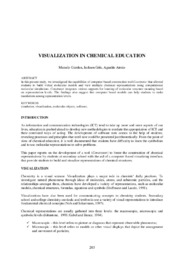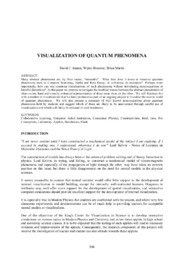Browsing Computer Based Learning in Science (CBLIS) by Title
Now showing items 303-322 of 337
-
Using midi in music instruction
(Pedagogical Faculty of University of Ostrava, 2001)The contribution deals with practical use of musical format MIDI in singing lessons and in improving the technique of playing musical instruments. Even the practice of one s part in harmonizing with other musical instruments ... -
Using of tips programs packages in engineering education
(Pedagogical Faculty of University of Ostrava, 2001)One of the tasks of higher school is to teach students for creative work. This task equally concerns both to students of natural sciences specialities, and the pupil – “humanities”. In this report the main features of the ... -
Using physical and virtual manipulatives to Enhance conceptual understanding in heat and temperature
(University of Cyprus, 2007)The purpose of this study was to compare the effect of Physical Manipulatives (PM) and the combination of Physical Manupulatives with Virtual Manipulatives (VM) on pre-service teachers’ understanding of scientific concepts ... -
Using real -time graphs to enhance understanding of kinematics graphs: motions detectors in the physics classroom
(University of Cyprus, 2010)The activities and the case study were inspired by publications uncovering a consistent set of student difficulties with graphs of position, velocity and acceleration versus time. Research indicates that the use of a Motion ... -
Using technology in early childhood education: the 100 days of school project
(Department of Educational Sciences, University of Cyprus, 2003)This study has three primary objectives. First, it describes the ways in which six teachers in an urban school environment in New York City integrated technology within a common and familiar theme among lower grade students, ... -
Using the attitude-behavior theory of Reasoned action to understand science teachers' attitudes towards physics, computer simulations and inquiry-based experiments
(Department of Educational Sciences, University of Cyprus, 2003)The purpose of this paper was to investigate how use of an Interactive Computer-Based Simulation (ICBS) prior to performing a Laboratory Inquiry-Based Experiment (LIBE), in a conceptually oriented physics course, affects ... -
Using webct with an off-campus diagnostic ultrasound course
(Department of Educational Sciences, University of Cyprus, 2003)Monash University in Melbourne, Australia, offers a Graduate Diploma in Medical Ultrasound by off-campus distance learning (DL). These DL students are required to study under significantly different circumstances than ... -
Using wikis as a teaching and learning resource
(University of Cyprus, 2007)Wikis represent the next natural and logical development in the ‘history of writing’. They were first introduced over 10 years ago as a fully editable writing tool to facilitate collaboration through the use of networked ... -
Verification of practical skills in an e-course
(2010)eLearning has become quite popular among students, educational institutions and official authorities. Many institutions have decided to employ this study tool in their programs. The eLearning environment enables knowledge ... -
Video-measurements in physics teaching
(University of Zilina, 2005)Videomeasurements of different kinds of motion can be a useful tool to help understanding of concepts and laws of motion. In the article there are examples of designed videoclips and videomeasurements of different situations ... -
Virtual biology: do we need the real thing?
(Department of Educational Sciences, University of Cyprus, 2003)One of the debates within biology teaching is the appropriate use of animals and plants to enhance the learning experience. In particular significant amounts of time are often set aside within curricula for relevant practical ... -
Virtual electronic learning in Vocational and initial teacher Training: an international report
(University of Cyprus, 2007)The Leonardo project under the acronym VELVITT is examining the potential use of Virtual Learning Environments (VLEs) as tools to enhance and extend the delivery of teacher training in vocational subjects. A particular ... -
Virtual fetal pig dissection as an agent of Knowledge acquisition for female high school Biology students
(Department of Educational Sciences, University of Cyprus, 2003)This study attempted to determine if a virtual fetal pig dissection can be used as a viable alternative for an actual dissection for females enrolled in high school biology classes by comparing the knowledge acquisition ... -
Virtual field trips in science: why students Would rather take them than leave them
(Department of Educational Sciences, University of Cyprus, 2003)Virtual Field trips open new possibilities for instructional designers to create more interactive worlds for learners. However is the interactivity afforded by such desktop systems for users sufficient for learners to feel ... -
A virtual laboratory for data communications
(Pedagogical Faculty of University of Ostrava, 2001)University(CQU), formerly Capricorn Institute of Advanced Education(CIAE). Throughout this period, staff have struggled to meet the challenge of creating an engaging educational experience that can be delivered to all students. ... -
Virtual optical illusions for creative learning
(Department of Educational Sciences, University of Cyprus, 2003)An amazing “rotating ring” optical illusion was studied in the frames of the students’ educational computer-based research work. Virtual images of differently shaped moving objects were simulated in QBasic 71, MS Visual ... -
A virtual teaching and learning Environment
(Pedagogical Faculty of University of Ostrava, 2001)We may say the knowledge is the new global asset – so people have to be continually learning, crafting innovative solutions to changing circumstances, staying informed and responsive. Computer Based Learning (CBL) ... -
Visualization in chemical education
(University of Zilina, 2005)In this present study, we investigated the capabilities of computer-based construction tool Construtor that allowed students to build virtual molecular models and view multiple chemical representations using computational ... -
Visualization of quantum phenomena
(University of Cyprus, 2007)Many abstract phenomena are, by their nature, "unseeable". What then does it mean to visualize quantum phenomena such as Compton Scattering, Alpha and Beta Decay, or collisional de-excitation? Perhaps more importantly, how ... -
Volume: a computer microworld For the learning of the concept of volume
(University of Zilina, 2005)This paper presents the design and basic features of a computer microworld for learning the concept of volume, for use by both primary and secondary level education students. The design of this microworld is the result of ...
